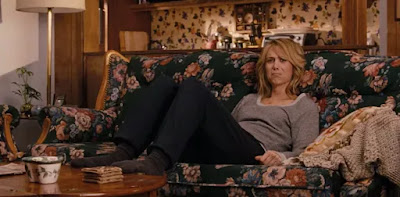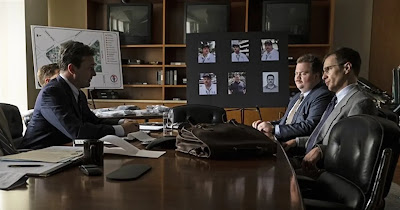Written at the time of the film's release...
 "The Miss of Sisyphus"
"The Miss of Sisyphus"or
"Wiiging Out"First off, Kristen Wiig is scary. She's scary funny. And scary smart. It's an almost sure thing that she'll be the best thing in whatever she appears in (certainly that was true of MacGruber). She has no Dolby and no squelch in her comedy, the filters are off, and she's not afraid to look like a doofus. In fact, I don't think she's afraid of anything.
And because she co-wrote this and is primarily the focus for the vast majority of Bridesmaids, it is a pretty funny, raunchy comedy of the "incredible mess" variety. And who doesn't want to see a wedding fail (especially if its not yours)? That's the premise behind this film (for better and for worse), and I've been to and/or been involved in enough weddings to know that this could easily have been a documentary.* The various rituals and ceremonies that precede, pre-function and prevaricate the actual hitching of one individual to another, are enough to wreck any marriage before it begins, and I'll frequently pontificate that if you survive the wedding, the marriage just might make it.**
And I've been to one wedding where in the course of the pre-functions, the Maid of Honor was replaced in the Bride's affections by another friend, as happens here. It happens.
Said Maid of Honor, who by herself is an "Incredible Mess," is Annie (Wiig), who has zero self-esteem, is dating a self-absorbed creep (naturally, as he's a man, played by an un-credited Jon Hamm—who, bless him, seems to be having fun)—except it's not really dating so much as an empty sexual convenience, she's lost her specialty bakery business, and is working at a jewelry store, where her tirades about the impermanence of all relationships has a tendency to drive the customers away. Her mother (Jill Clayburgh—her last role before she died of cancer) wants her to move in with her "before she hits rock-bottom," because her room-mates are British and creepy. At least she has her best friend Lillian (Maya Rudolph), who is always good for a meltdown de-briefing.
That is, until Lillian announces her engagement and asks Annie to be the M of H. Then, like a black hole, the downward spiral that is Annie's life starts to suck in the wedding arrangements, as well. She gets together the other bridesmaids: Rita (Wendi McLendon-Covey), a bitter wife with two problematic kids; Becca (Ellie Kemper) a chirpy newlywed; Megan (Melissa McCarthy—hilarious and fearless), the groom's sister; and Helen (Rose Byrne), a trophy-wife, who is needy, tries too hard, and is aggressively perfect. This eclectic gaggle of women are tough to corral and all approach life and their duties to the bride-to-be differently, leaving the slightly scattered Annie dishonored and in their wake of agendas. In her desperate attempt to get them all on the same page (or even in the same dress-style), she only makes things worse, especially for herself. The only non-crumbling structure in the whole disaster area that is her life is a state patrol trooper (Chris O'Dowd—think the looks of Tim Allen, the charm of Judge Reinhold, and the accent of Craig Ferguson) but that gets doused as well. Pretty soon, rock-bottom seems like a pretty stable place to be, as she loses everything, even an invitation to the wedding.
This would be intolerably sad, if the cast and writers didn't make it so hellaciously funny, in a surprising, raunchy manner that rains humiliation down on everyone, the highlight (possibly) being the visit to a posh, expensive bridal shop after a dysentery-inducing exotic pre-function. It's cruel...like watching a train-wreck, where all the passengers were caught in the bathroom, but it is funny—humor, one must caution, being subjective.
I'd be heartily recommending this movie*** if it didn't go all-"Oprah" in the last section, with a tone-scrambling heart-felt ending that one is just not prepared for, and it also coasts on my most hated of rom-com tropes—"all she needs is a good man. Really? I'd've said a good psychotherapist.
But, until that time, Bridesmaids is the most snortingly funny disaster movie I've seen in a long time.* I just had a two-hour conversation with someone who participated in a recent June wedding, where everything went flawlessly, but the backstage story was an on-going apocalyptic disaster from start to finish.
** That's an incredibly sunny view, considering I've been married twice. On the other hand, there was one wedding I went to where the bride and groom were already arguing...at the altar. The reception was dominated by placing wagers on how long it would last.
*** And have, to two gals who wanted a movie-night and were, understandably, less-than-thrilled with the current movie selection. They couldn't be two more different people. Both loved it.





















































